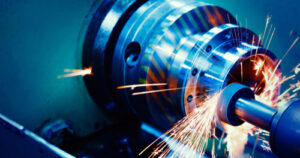 Industrial metal machining plays a significant role in manufacturing processes across various industries. From automotive to aerospace, the precision and quality of machined metal parts are crucial for the overall performance and safety of the end products. In this blog post, we will explore how quality control is ensured in industrial metal machining and the steps taken to maintain high standards throughout the process.
Industrial metal machining plays a significant role in manufacturing processes across various industries. From automotive to aerospace, the precision and quality of machined metal parts are crucial for the overall performance and safety of the end products. In this blog post, we will explore how quality control is ensured in industrial metal machining and the steps taken to maintain high standards throughout the process.
1. Design and Engineering:
The first step in ensuring quality control in industrial metal machining is a well-defined design and engineering process. Before any machining begins, detailed engineering drawings and specifications are created. These blueprints provide precise measurements, tolerances, and material requirements, ensuring that the final product meets the intended design.
2. Material Inspection:
To maintain quality, the inspection of raw materials is essential. The quality control team thoroughly examines the metal stock before machining begins. This includes checking for material defects, such as cracks, voids, or inconsistencies in composition. Any substandard materials are rejected, ensuring that only high-quality metal is used in the machining process.
3. Machine Calibration:
Machine calibration is a critical aspect of quality control in metal machining. Regular calibration of machines ensures that they are operating within the specified tolerances and producing accurate results. Any deviations from the desired measurements can be addressed promptly, avoiding the production of faulty parts.
4. Operator Training and Skill:
Quality control also depends on the expertise and proficiency of the machine operators. Skilled operators are trained to follow precise instructions, handle the machines correctly, and interpret engineering drawings accurately. The training includes understanding different cutting techniques, tool selection, and proper use of measuring instruments. Well-trained operators contribute significantly to maintaining the desired quality standards.
5. Inspection and Measurement:
Throughout the machining process, rigorous inspection and measurement procedures are implemented to ensure accuracy and precision. This includes the use of various measuring instruments, such as calipers, micrometers, and gauges, to verify dimensions, tolerances, and surface finish. These inspections are carried out at different stages of machining to identify any deviations from the desired specifications, allowing for timely adjustments or corrections.
6. In-process Control:
To further validate quality, in-process control measures are implemented. This involves periodic checks during the machining process to ensure that each step is executed correctly and that the dimensions and tolerances are being maintained. These controls help identify and rectify any issues before proceeding to the next stage, minimizing the possibility of producing defective parts.
7. Final Inspection:
Once the machining process is complete, final inspection is conducted on the finished metal parts. This comprehensive inspection checks for dimensional accuracy, surface finish, and adherence to the desired tolerances. Sophisticated inspection technologies, such as Coordinate Measuring Machines (CMM) or optical scanners, are used to ensure that the final products meet the required standards.
8. Statistical Process Control (SPC):
Statistical Process Control techniques are often employed in industrial metal machining to monitor and control the quality of the production process. SPC involves collecting and analyzing statistical data during different stages of machining to identify any variations or trends that could impact the quality of the final output. This data-driven approach allows for proactive adjustments and improvements, ensuring consistency and reliability in the production of machined metal parts.
Conclusion:
Quality control in industrial metal machining is a comprehensive and multi-faceted process that requires meticulous attention to detail at every stage. From design and material inspection to operator training, machine calibration, and in-process controls, each step is crucial to maintaining high-quality standards. Through effective quality control measures, industries can ensure that the machined metal parts they produce meet the required specifications, ultimately contributing to the overall performance and safety of the end products.
Got Questions? Let Us Help!
Established in 1956, Metal Works Corporation is an A.S.M.E. certified industrial fabrication company specializing in pipe and tube bending, pipe fabrication, coiling, vessel fabrication, and welding for major industries. Metal Works Corporations in house’ machine shop has unique capabilities and produces specialty springs of all alloys, custom rotating mechanical seals, and various other industrial components. We appreciate customers and work to forge lasting relationships built on trust and reliability. Please contact us and allow our team to be the shortest distance between problem and solution for your unique industrial requirements.

